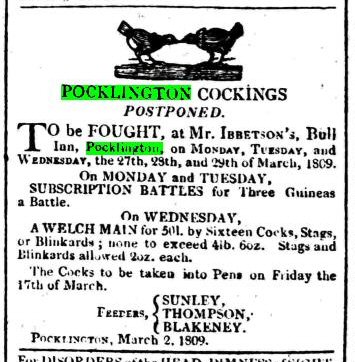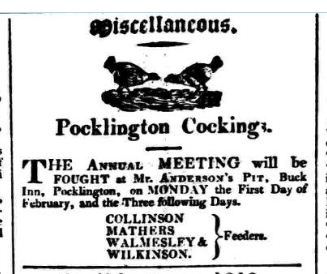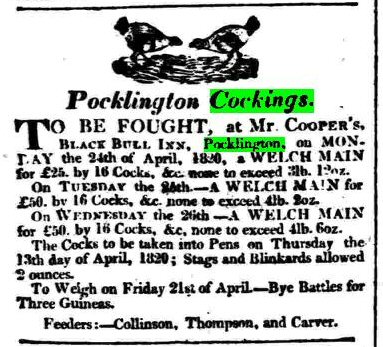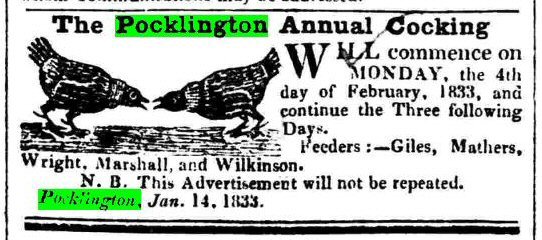|
The Cockfighting Bell illustration is from 'A History of Pocklington School' by P.C. Sands and C.M. Haworth |
| The Pocklington School Cockfighting Bell has the names of Thomas Ellison and Johanes Clarke. John Clarke was master at the school 1660 to 1664 and Thomas Ellison followed him between 1664 to 1693. This shows that Cockfighting took place in Pocklington from at least the seventeenth century |
|
The Cockpit by William Hogarth |
| |
| Early Cock Fighting references with the Black Bull Inn as earliest stated venue in Pocklington: |
| 1707 Jul 16, Will. William Westoby of Pocklington gent. |
Bequests to wife; daughters Dorathy Westoby and Mary wife of Francis Stanfeild gent.; son Edward; grandaughter Mary Stanfeild; Gyles Bateson shoemaker; John Horsley of Pocklington; Frances Tadman of Beverley; nephew Matthew Westoby; kinswoman Ann Thorp; poor of Pocklington; Elizabeth Carr; George Browne; servants Elizabeth Scaife and John Young: house, tenement, cock pit and adjoining croft, and 1/2 oxgang in the fields in Pocklington. Farm in Skipwith. Money, plate: Witn. Fr. Dandridge, John Collins, Edw. Ayscoghe. Probate 11 May 1709. |
| 1746 May27, York Courant |
A Main of Cocks to be fought at Mr. James Bagley's new pitt in Pocklington, for ten guineas a Battle and a hundred** on the Main; betwixt Henry Tarburgh, Esq., of Heslington and Edward Wormley, Esq., of Rickall to shew Thirty-One Cocks on each side for the Main, and Twelve on each side for Bye-Battles; to weigh on Tuesday the 24th June, and fight Wednesday, Thursday and Friday following.
Mr George Meek }
and ...................} Feeders
Mr John Emit..... }
** 100 Guineas is a large amount of money at this date. The average annual income for a typical working man was 20 pounds. It is equivalent to a few tens of thousands of pounds today.
|
| 1747/8 Mar1, York Courant |
To be fought
At Mr James Bagley's new Pit at the sign of the Black Bull, in Pocklington
A Main of Cocks, by the Gentlemen of Holm and Weighton, against the Gentlemen of Pocklington***; to shew Thirty-One Cocks on each side for the Main, and Ten on each side for Bye-Battles; and to fight for four guineas a Battle and forty on the Main; to weigh on Saturday the 12th March, and fight on Monday, Tuesday and Wednesday following. There will be an ordinary every day at the same house
Mr George Meek }
and ...................} Feeders
Mr Will. Marshall }
*** The Gentlemen of Pocklington were big players in the persuit of 'Cocking'. York Courant, April 2, 1751, "To be fought, at Mr William Smith's INN, in New Malton, A Main of Cocks between the gentlemen of Malton and the gentlemen of Pocklington for five guineas a battle and fifty the main, or odd battle to weight the 6th May next, and fight the four....." (Rest of entry missing).
York Courant, Nov 26, 1751, "To be fought, at Mr Robert Norris's cock pit, in Beverley, a main of cocks, between the gentlemen of Hull and Beverley, and the gentlemen of Leeds and Pocklington, for five guineas a battle and fifty the main or odd battle. To weigh the first Tuesday in March, and fight the three following days. Feeders: Mr Sutton for Hull & Beverley and Mr Nicholas Nixon, known by the name of Farmer, for Leeds and Pocklington. n.b. The above gentlemen fight a match at Beverley Races for the same sum."
An Historical List of Horse-matches Run and of Plates and Prizes Run for in Great Britain and Ireland, in 1751 Page 163 - Cockfight, Pocklington 7 Malton 6.
An identical advertisment to the latter appeared in the York Courant in Feb 4th, 1752 with the weighing date of 3rd March, 1752.
|
1753 Apr17, York Courant
(The practice grew to the county level as shown by this newspaper entry) |
To be fought at the new pit of Bradford. A Main of Cocks betwixt the gentlemen of Yorkshire and Gentlemen of Lancashire, for ten guineas a Battle and a hundred guineas on the Main to shew Forty-One Cocks for the Main, and twenty for Bye-Battles; to weigh on Saturday the 20th April inff., and fight Monday, Tuesday, Wednesday, Thursday following, being Easter week. Feeders; Thomas Tong for Lancashire, Nich. Nixon forYorkshire.
|
| 1765 22Jan, York Courant |
To be fought, at William Waide's pit in Pocklington, A Main of cocks between the Gentlemen of Pocklington and the Gentlemen of the North Riding, to shew 31 Cocks for the Main, and to fight for two guineas a Battle and Twenty Guineas the Main or odd Battle. To weigh on Saturday, the 2nd of February, and fight on the Monday, Tuesday and Wednesday following. Feeders - James Harrison for Pocklington, Marm Wainman for the North Riding. |
| 1765 26Mar, York Courant |
To be fought, at William Smith's pit in Pocklington, A Main of cocks between the Gentlemen of the West Riding and the Gentlemen of Pocklington, to 25 Cocks on each side for the Main, and 10 on each side for Bye-Battles. To fight for four Guineas a Battle, and 40 Guineas the Main Battle. To weigh on Saturday, the 6th of April, and fight on the Tuesday, Wednesday and Thursday following. Feeders - William Brook for the West Riding, Thomas Meek for Pocklington. |
| 1765 07May, York Courant |
To be fought, at the New Inn near Pocklington, A Main of cocks between Mr. Oliver and the Gentlemen of the East Riding, for two guineas a Battle and Twenty Guineas the Main, and 10 for Byes. To weigh on Saturday, the first of June, and fight on Monday, Tuesday and Wednesday following. Feeders - Mar. Wainman for Mr. Oliver, James Harrison for the East Riding. |
|
A Handbill for the Buck Inn from 1802.
Reconstructed from a fragile original held by the British Library.
Ref: Humanities and Social Sciences, 1879.c.13.(18.) |
A Welch Main was a contest to leave the last cock standing. It was an elimination contest starting with around 16 pairs, the next round were the eight winners, and so on until one was the winner. The birds themselves were fitted with expensive silver spurs designed to inflict damage to the opponent. The contests usually coincided with local horse races when there was an influx of Gentlemen inclined to bet heavily on the outcome of the battles.

The York Herald March 04 1809

The York Herald Jan 9th 1819
Sir James Pennington of Warter wrote in 1780; “The abominable practices in Pocklington, which prevail in almost every public house of carding, cocking and every species of Gambling”. He described an alehouse (probably the Buck Inn) run by Pemberton Scaife “it should be suppressed. It is one of the most notorious disorderly Bawdy houses, and a nuisance to the whole country”

The York Herald -April 15th 1820
Ironically, though Pocklington was one of Yorkshire's top places for cockfighting, the most famous Pocklingtonian, William Wilberforce, was instrumental in it being banned. Just as Wilberforce's campaign against slavery took many years to come to fruition (he began the campaign in
1787 but slavery was not completely abolished until just before his death in 1833) so the movement to end cock fighting needed decades to succeed.
Wilberforce supported Dent parliamentary motion to ban bull baiting in
1802 which was defeated 64-51 at its second reading, and Wilberforce was criticised in the house for being against bull baiting but being a supporter of Yorkshire horseracing. Cock fighting was soon put alongside bull baiting on the abolitionists hit list. Wilberforce was one of the founders of the Society for the Prevention of Cruelty to Animals in 1824 and cock fighting became gradually less popular, particularly after the 1835 act against animal cruelty, but it was not completely banned until 1849.
Public opinion was changing. Well illustrated by a letter to the Yorkshire Gazette and published in the edition of 2nd Feb 1828 protesting about the intention to have Cock Fighting at the forthcoming York Races.
To the editor of the Yorkshire Gazette
Sir,
Having seen in your paper a few weeks ago a paragraph announcing that a large betting room was in a state of preparation against the May races; and to make these races still more attractive, it further announced, that it was intended to get up a cockfight in the same establishment, for the delicious gratification, no doubt, of those 200 or more benevolent subscribers, who have agreed, it is said, to patronize the person who is expending the money to a very large amount for their accommodation. I hope you will have the goodness to allow me to state, from on authentic document, what is the nature of this heard-hearted and bloody amusement; and its brutalizing tendency on the minds who delight therein.
At what period of the history, and by whom pitched battle of cocks was introduced into this country, is difficult to state. There is no doubt that it was practised at a very early time. But, what aggravates the reproach and disgrace upon Englishmen, are those species of fighting, what are called the battle-royal, and the Welsh-main, known nowhere in the world but here; no, not even among the savage tribes in America. These scenes are so bloody, as almost to be too shocking to relate; and yet, as many may not be acquainted with the horrible nature of them, it may be proper, for the excitement of our aversion and detestation, to describe them in a few words. In the former, an unlimited number of fowls are pitted, and when they have slaughtered one another for the diversion (Dii bani!) of the otherwise generous and humane Englishmen, the single surviving bird is to be esteemed the victor, and carries away the prize. The Welsh Main consists, we will suppose, of 16 pairs of cocks; of these, the 16 conquerors are pitted a second time; the 8 conquerors of these are pitted a third time; the 4 conquerors the fourth time; and lastly, the 2 conquerors of these are pitted a fifth time; so that (incredible barbarity!) 31 cocks are sure to be most inhumanely murdered for the sport and pleasure, the noise and nonsense, the profane cursing and swearing, of those who have the effrontery to call themselves, with all their bloody doings, and with all this impiety about them, CHRISTIANS; nay, what with many is a superior and distinct character, men of benevolence and morality.
But let the morality and benevolence of such be appreciated from the following instance, recorded as authentic, in the obituary of the Gentleman's Magazine, for April 1789 - "Died April 4, at Tottenham, John Ardesoif, Esq., a young man of fortune, and in the splendour of his carriages and horses rivalled by few country gentlemen. His table was that of hospitality, where it may be said he sacrificed too much conviviality: but if he had his foibles, he had merits also, that far outweighed them. Mr Ardesoif was very fond of cockfighting, and had a favourite cock upon which he had won many profitable matches. The last bet he had upon his cock he lost; which so enraged him, that he had the bird tied to a spit, and roasted alive before a large fire. The screams of the miserable animal were so affecting, that some gentlemen who were present attempted to interfere, which so enraged Mr. Ardesoif, that he seized the poker, and with the most furious vehemence declared, that he would kill the first man wo interposed; but in the midst of his passionate asseverations, he fell down dead upon the spot. Such, are we assured, were the circumstances which attended the death of this great pillar of humanity" And they were so horrible, that they require no comment.
It was hoped, that this brutalizing amusement, which has ceased in York for so many years, would never again have been seen or heard of, within our walls. The good sense and humanity of the citizens I trust are such, as will excite their abhorrence of the practice in such a way, as will convince the individual attempting to re-introduce it, that they are Christians, and not brutes, among whom he has come to reside. It will be well for the Magistrates also, to keep a watchful look-out; or it may be they will find, before they are aware, what, in London, is not unaptly called a HELL, rising up about them; and which, eventually, will turn out the greatest curse, that ever befell our venerable city.
Hoping that you will find room for the remarks,
I remain your's truly,
A WATCHMAN
York, Jan. 28, 1828

The York Herald, and General Advertiser January 19 1833
The banning of the old traditional sports contributed to the final end of Pocklington's fairs that had flourished on the common throughout the medieval period. Cock fighting and bull and bear baiting were popular events at Pocklington fair, along with mob football (a free for all rugby like game) in the market place. But just as the animal blood sports were banned by Act of Parliament, so mob football was made illegal on public streets and roads in the 1835 Highways Act. This was soon followed by the decline in the commercial business of the traditional fairs, with the coming of the railway in particular meaning that goods and produce could be purchased from local shops whenever the customer wanted, rather than only at fairs every few months.
In Pocklington, the fairs were replaced by shows with the Horse & Foal Show, and the Flower Show, which both started circa 1850 being the most popular. Specifically, after 1849 game cock classes, where cocks were bred for their looks and plumage, replaced cockfighting at the shows.
From 'The History of Barmby Moor' by W.D. Wood Rees (pub. 1911)
Chapter XXXIV
GREENLANDS FARM is full of interest, and merits a chapter to itself. This farm is now the the the property of the Governors of the Pocklington Grammer School. The name of one of the fields is not without significance, and tells us something of the rude amusements of our forefathers, namely, "The cock pits." I found the pit to be amphitheatre in shape; it had a small area in the middle composed of bricks, which were ploughed up when the field was brought into cultivation some years ago. Mr. Josiah Richardson and Mr. Thomas Taylor remember cock-fights taking place up to 1859. One Thomas Giles was the cock-feeder in those days. It appears that the birds required a particular diet (chiefly meat) to make them pugnacious. We are told a certain victorious breed was called "Hen Cocks," from the fact of their having tails like hens. The last fight described by an eye witness was between birds belonging to Beck and Rhodes, of Pocklington.
At the Grammer School, at Pocklington, there is a silver bell which was given as a prize to encourage cock-fighting. This bell is 249 years old, 1oz in weight, nearly 2 inches in height, and 7½ inches in cercumference; aroud the side, in curious engraving, we read : -
"Johannes Clarke, Moderator, 1660, Scholae Liberae Grammaticalis de Pocklington"
"Thomas Ellison, Moderator 1666, Scholae Liberae Grammaticalis de Pocklington"
This bell is carefully guarded by the Head Masters, and handed down from time to time. We mention this because the cockpit field is on school property and part of the school buildings and a large portion of the lawn are in the parish of Barmby Moor. The bell had to be competed for in the following manner :-
A main (several) of cocks, each held in the hands of owners, were selected to fight. The owner of the victorious cock held the bell until the bird was beaten, but for safe custody it was always placed with the moderator or master. We find the following curious entry in the diary of the Rev. J. Tyson, curate of Londesbrough cum Barmby Moor, September 15th 1818: "On this and the following day Condor, of Tadcaster, and Burton, the newly elected M.P. for Beverley, raised an infamous uproar at Barmby Moor by making a paltry horse-race and a blackguard cock-fight"
From the Hull Daily Mail of 7th February 1931 is the following article:
At an exhibit at the exhibition of sporting pictures organised Lady Allendale at her London home in Piccadilly was not a picture. It was a framed manuscript bearing the rules of the old sport of cockfighting. These, although the ink has faded and the lettering is old are legible and are quoting.
" The Rules and Order of Cock-fighting."
1. All cocks shall fight with faire hacket and nosses shorne.
2. All cocks shall fight with spurs, of same length.
3. There shall be in all pits at Selbey's one master, two wardens, one holder of stakes.
4. man shall touch any cock after faire set to hare been made.
5. All dues to be paide as soon as cock be killed.
6. All cocks present but not fighting shall hooded until they put in the pit.
7. No cock's eyes to blinded under forfeit of forty shillings.
8. No pricks to used to cut any cock.
9. Any man breaking rule eight to forfeit the dues of his wages or be fined twenty shillings.
10. Any man who shall not pay his dues on one wager and maketji another wager to be put in basket and be hung to the eaves of the pit that all men may sec him and to remain there until the end of the session when he shall cut down.
11. All disputes and harsh talkes shall be taken to the Master for his decision.
12. If both cocks killed in fight then shall all wagers be settled a single throw of the dice by the Master.
13. The Master's decision shall accepted all men as final all cases.
14. The Master and officers to be chosen ballot on the first of the month.
15. All cocks to taken from the pit if cock be killed after one hour of cocking.
From the rules sanctioned Mr Ardesais, St James's Park, London. Pit High-street, Eton, Bucks. A note the catalogue states that the old Cockpit, its floor paved with knuckle bones to give the birds a good grip of the ground, can still seen at the rear of the Cock Pit House at Eton.
[In the York Courant for 1752 appears an advertisement for "Calculations for Cockings" on Copper-plates, price one shilling. I would love to get a copy of these rules. Please contact me if you could supply a copy. I know they exist, as a set was sold in a Sussex auction in 1998.]
|

